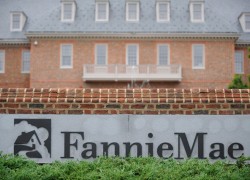
The bill would replace the Federal Housing Finance Agency, the current conservator of Fannie Mae and Freddie Mac, with a new government agency, the Federal Mortgage Insurance Corporation (FMIC).
The new FMIC, structured as an independent agency similar to the Federal Deposit Insurance Corporation, would serve as a regulator and guarantor of the secondary mortgage market. Specifically, it would:
- Purchase home loans from originators, providing liquidity in housing finance markets.
- Develop standards for approval of private issuers of mortgage-backed securities (MBS). These private issuers of MBSs—essentially utility entities to the FMIC—would then issue the securities to private investors.
- Explicitly guarantee MBS securities holders against losses. The bill would require that investors take first-losses at no less than 10 percent on the security investments. The FMIC would assume responsibility to cover all losses not borne by private investors. It would cover these remaining losses in the MBS market through a mortgage insurance fund supported by the full faith and credit of the U.S. government.
- Continue the promotion of affordable housing goals through a Market Access Fund.
These are the same kinds of policies that undermined the U.S. housing finance system and stable homeownership over the past two decades.
In the years before the 2008 housing crisis, there was little concern among private investors about the underlying strength of the mortgages that backed MBSs, because Fannie and Freddie assumed these risks with the implicit guarantee of the federal government. Corker–Warner would simply replace the names of the entities with the full faith and credit of the U.S. government.
These guarantees are not needed. The federal government already plays the role of underwriter and guarantor through the Government National Mortgage Association (Ginnie Mae), which serves targeted groups of potential homeowners (mostly low-income, military, and eligible first-time homebuyers) who would not likely be served by the conventional mortgage market.
The Corker–Warner bill would effectively place the remainder of the U.S. secondary mortgage markets under the FMIC—as the underwriter, regulator of mortgage-backed security issuers, and backstop to the entire system for all losses not absorbed by private capital.
This effort is not surprising, given the myriad interest groups with huge stakes in the continued expansion of mortgage credit and the political incentives to provide handouts through loose mortgage credit. This system would only continue undermining responsible, stable homeownership and do little to avoid the many policy mistakes of recent years.
Source material can be found at this site.









